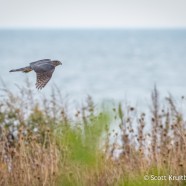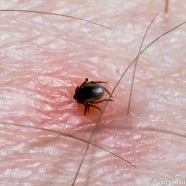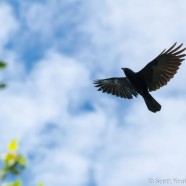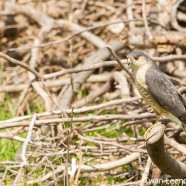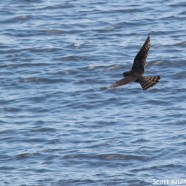Cooper’s Hawk
I have been posting many photos of migrant songbirds lately, and here is one of their predators – the Cooper’s Hawk (Accipiter cooperii). This raptor of the forest is an extremely agile and talented flier, able to navigate through thick woodlands in pursuit of prey. You may recognize them from your yard as they are frequent bird feeder guests, targeting hungry passerines. They seem to be less adept at capturing prey in open areas like this one, unable to fully utilize their maneuverability and relative speed as they do in more dense habitat to surprise and outwit songbirds. This...
Read MoreLyme Disease
I have Lyme disease. Thankfully most people have now heard of Lyme disease, but for those who have not, Lyme borreliosis is an infectious disease caused by bacteria of the Borrelia type and transmitted to humans (or pets!) by a black-legged/deer tick bite and subsequent feeding by the parasite. It typically takes 24 or maybe 36-48 hours of feeding for the disease to be transmitted if the tick is a carrier, though this is not a guarantee either direction. Lyme disease can cause flu-like symptoms nearly immediately, and if untreated they can be followed by severe headaches, joint and muscle...
Read MoreFish Crow Marauders
This is a marauding Fish Crow (Corvus ossifragus), as identified by voice, flying through a neighborhood and searching for nests to raid. If you have a lot of experience with them you can get used to picking out the slightly smaller Fish vs. American Crow as well. Whether it is tiny hatchlings or developing eggs the many nests that fill our lands, from forest to shore, are often extremely tempting targets for corvids at this point in the season. Both a male and female Baltimore Oriole were aggressively attacking this bird until it vacated the area. Groups of Fish Crow are an enormous threat...
Read MoreYard Sharp-shinned Hawk
Here is a somewhat bigger recent bird from Twan’s yard, the Sharp-shinned Hawk! Hey, raptors have to eat too, and they are doing their biological function by preying on the various other avian populations in the area. They have growing young that need all the food they can get…after all, a significant percentage of their soon to be fledged and subsequently juvenile birds will starve to death. Nature is a difficult balance to say the least.
Read MoreWater Merlin
Those falcons sure do love their water! They know that birds are in the open, exposed, sometimes exhausted and usually abundant along bodies of water including oceans, rivers, lakes, swamps and more. At this time of year, with so many birds on the move back to the north, hunting along and over water makes life easier for a falcon like this Merlin, able to snag prey that is already in a foreign place and tired from a long journey across the globe. Clever predator.
Read More



